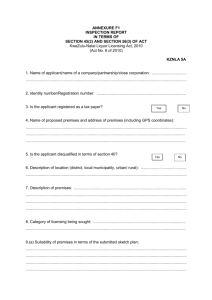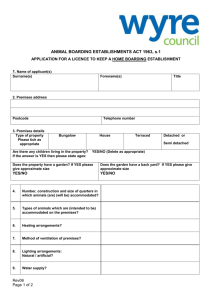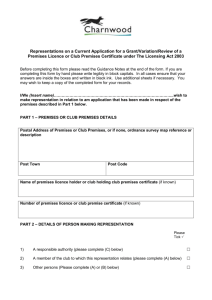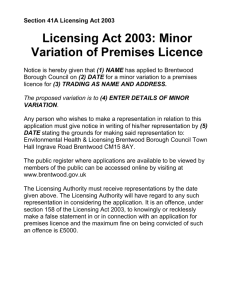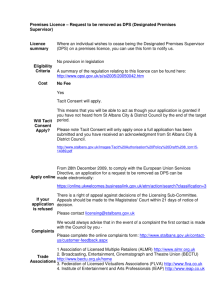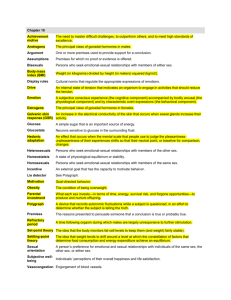Licensing Tools. - Alcohol Learning Centre
advertisement
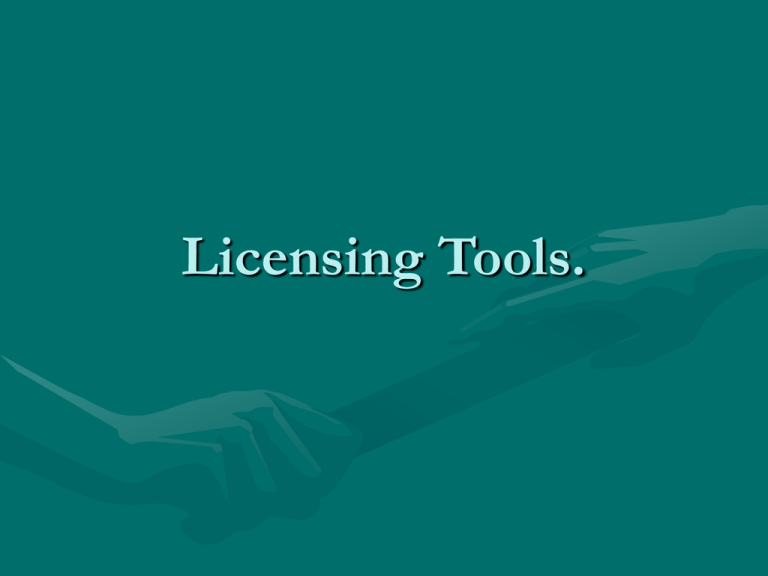
Licensing Tools. Licensing Act 2003. This was the primary legislation surrounding enforcement but we have some new toys, and some old favorites that we don’t like to thropw away just yet. New stuff, and some old favourites; • Mandatory Conditions. • License Premises Exclusion Orders. • Drink Banning Orders. • Persistently possessing alcohol in public place. • Test Purchasing • Review power for Licensing Authority. • Multiple sales to under 18’s. • Expedited Review. • Designated public place orders. • Alcohol diversion schemes. • Confiscation of alcohol from under 18’s. • Directions to leave the area. • Unauthorised Sales Closure Notice. 2009 Crime and Policing Act. • Amends Various Acts, including Licensing Act 2003, Confiscation of Alcohol (young persons) act 1997 and Violent Crime Reduction Act 2006. • All in our favour! Mandatory Conditions. Licensing Act 2003, as amended. From the 6th April 2010. Irresponsible Drinks Promotions. • The responsible person shall take all reasonable steps to ensure that staff on relevant premises do not carry out, arrange or participate in any irresponsible promotions in relation to the premises. What is ‘irresponsible’? • carried on for the purpose of encouraging the sale or supply of alcohol for consumption on the premises in a manner which carries a significant risk of leading or contributing to crime and disorder, prejudice to public safety, public nuisance, or harm to children– Games. • games or other activities which require or encourage, or are designed to require or encourage, individuals to– • drink a quantity of alcohol within a time limit (other than to drink alcohol sold or supplied on the premises before the cessation of the period in which the responsible person is authorised to sell or supply alcohol), or • drink as much alcohol as possible (whether within a time limit or otherwise); Free or discounted alcohol. • provision of unlimited or unspecified quantities of alcohol free or for a fixed or discounted fee to the public or to a group defined by a particular characteristic (other than any promotion or discount available to an individual in respect of alcohol for consumption at a table meal, as defined in section 159 of the Act); • NOTE; Guidance differs from this. Free or discounted price? • The guidance uses the phrase “large quantities of alcohol for free or discounted cost”. • Legislation uses the phrase “provision of unlimited or unspecified quantities of alcohol free or for a fixed or discounted fee”. Guidance gives examples of breaches as being “all you can drink for £10”, but also “10 pints for £10”. Is this “unspecified or unlimited”? Be aware of the differences between legislation and guidance. Prizes for Drinking! • provision of free or discounted alcohol or any other thing as a prize to encourage or reward the purchase and consumption of alcohol over a period of 24 hours or less; Sporting Event. • provision of free or discounted alcohol in relation to the viewing on the premises of a sporting event, where that provision is dependent on– • (i) the outcome of a race, competition or other event or process, or • (ii) the likelihood of anything occurring or not occurring; Advertising. • selling or supplying alcohol in association with promotional posters or flyers on, or in the vicinity of, the premises which can reasonably be considered to condone, encourage or glamorise anti-social behaviour or to refer to the effects of drunkenness in any favourable manner. Dentist Chair and drinking water. • The responsible person shall ensure that no alcohol is dispensed directly by one person into the mouth of another (other than where that other person is unable to drink without assistance by reason of a disability). • The responsible person shall ensure that free tap water is provided on request to customers where it is reasonably available. And from the st 1 October: • The premises licence holder or club premises certificate holder shall ensure that an age verification policy applies to the premises in relation to the sale or supply of alcohol. • The policy must require individuals who appear to the responsible person to be under 18 years of age (or such older age as may be specified in the policy) to produce on request, before being served alcohol, identification bearing their photograph, date of birth and a holographic mark. and • The responsible person shall ensure that– • (a) where any of the following alcoholic drinks is sold or supplied for consumption on the premises (other than alcoholic drinks sold or supplied having been made up in advance ready for sale or supply in a securely closed container) it is available to customers in the following measures– • (i) beer or cider: ½ pint; • (ii) gin, rum, vodka or whisky: 25 ml or 35 ml; and • (iii) still wine in a glass: 125 ml; and • (b) customers are made aware of the availability of these measures. Not all drinks promotions are irresponsible, but managers are recommended contacting local licensing authority and/or police to discuss the promotion. Licensing Authority as interested parties. • Section 33 Policing and Crime Act 2009 amends sections 13 and 69 of the Licensing Act 2003 to allow members of a licensing authority to act as interested parties. This allows members of licensing authorities to make representations to object to licence applications or to call for a licensing review, powers which under the Licensing Act 2003 are only exercisable by interested parties or responsible authorities. So who does this mean? • Licensing Act 2003; • (1) In this Act “licensing authority” means— • (a) the council of a district in England, • (b) the council of a county in England in which there are no district councils, • (c) the council of a county or county borough in Wales, • (d) the council of a London borough, • (e) the Common Council of the City of London, • (f) the Sub-Treasurer of the Inner Temple, • (g) the Under-Treasurer of the Middle Temple, or • (h) the Council of the Isles of Scilly. • (2) For the purposes of this Act, a licensing authority’s area is the area for which the authority acts. Persistently possessing alcohol in public place. Section 30 Policing and Crime Act 2009. • A TIERED APPROACH. • Youth Alcohol Action Plan 2008 “unsupervised drinking and possession of alcohol is unacceptable”. • National Audit office in 2006 came up with the information that 2 thirds of people stop committing anti-social behaviour after 1 intervention, and 9 out of 10 stop after 3. Summary. • It is an offence to persistently possess alcohol in a public place. • Makes it illegal for a person under 18 to be in possession of alcohol on 3 or more occasions within a period of 12 consecutive months. • Must be used in conjunction with sec 29 of the Act which amends the Confiscation of Alcohol (young persons) act 1997 and Violent Crime Reduction Act 2006 which enable a constable to confiscate alcohol from those under 18 and ensures the young person is required to give name and address. ST 1 OCCASION. Confiscation, return young person home/place of safety if under 16 or Sec 27 VCRA, direction to Leave if appropriate. (Gives chance to take photo). Letter to parents copied to YOTS. Referral if appropriate to agencies such as young persons drug and alcohol services. nd 2 Occasion. • ABC, ASBO (more extreme cases) should be sought. • Treatment provision if necessary and appropriate from your local agencies. • Parental visits/parenting contracts/parenting orders. (Last case if ASBO is sought). rd 3 • • • • Occasion in 12 months. May be prosecuted. (ASBO on conviction?) You may have use of conditional cautions. You may have Youth Justice Resolution. Ensure appropriate and proportionate response to the level of behaviour. A tiered approach: Key challenge: •Partnership working •Cross force working • ASBO? • Fine • Treatment COURT •Confiscate and record •Take home? •Inform parents – write letter •YOT referral Key partners: • Parents • YOTs • Targeted Youth Support • Safer Schools Partnerships •Trading standards • ABCs • Parenting Order • Treatment • YOT intervention PRE-COURT • Confiscate and record • Take home? • Inform parents – write letter • YOT referral? ACTIONS • ABCs • Parenting Contract • Treatment • YOT intervention INTERVENTIONS Amendments under sec 29 and 30 Police and Crime Act 2009. • Confiscation (S29 Policing & Crime Act 2009) – No longer have to prove “intent to consume” – Must record name and address (requirement under the Act.) – Can remove to a place of safety (S1 Confiscation Act 1997) – Offence if refuse to surrender or fail to give name and address. • Directions to leave (S27 VCRA 2006) – Extended to 10 to 15 year olds – More effective management of mixed aged groups – Must ensure understanding – repeat or parent? – Can remove to a place of safety (S27 (4a) VCRA 2006) Practical considerations. • How do we record? • Speedy intervention required because repeat ‘offenders’/has enough time elapsed to allow intervention?. • Statements required for each case? • Partnership working with other agencies a must. • Do mobile data terminals record the information needed? • Boundary issues. • Criminalisation of young people is a concern. Apparently. Unauthorised Sales Closure Notice. (Sec 19-28 Criminal Justice and Police Act 2001, as amended by Schedule 6 Licensing Act 2003.) • Police Constable or local authority can issue a closure notice where; • Any premises are/have been used (24hours) for sale of alcohol for consumption on the premises without a license • Or any premises that have not acted ion accordance with the conditions of their license. If not remedied not less than 7 days, more than 6 months; • Police or local authority can seek a closure order from Magistrates which can physically close the premises; • Or require that unauthorised sale of alcohol be discontinued immediately. • If then run ‘in accordance’, cancellation notice must be issued. • Persistent selling – Change from 3 strikes to 2 strikes in 3 months Child arrested for using false ID in pub (MORNING ADVERTISER.) By John Harrington 12/05/2010 10:21 A 17 year-old girl has been arrested for fraud for allegedly using someone else’s ID to try to buy alcohol in a bar. It’s believed to be among the first time that the 2006 Fraud Act has been used to target attempts to allegedly buy alcohol underage. The girl, who has not been named, was arrested in a bar in Chelmsford, Essex, for fraud by false representation. She was bailed until today (12 May). It follows the launch of a Home Office poster campaign in March targeting underage drinking. The posters warned under-18s that if they are caught using fake ID, or ID that’s owned by someone else, they could have it confiscated and may be prosecuted. Robert Humphreys, chairman of the Proof of Age Standards Scheme (PASS), said: “It’s very welcome that there should be a better balance between regulation activity on the licensed trade and action against young people who use false documents to obtain • Talk about licensed premises exclusion of certain persons act. Not first occasion. On conviction. On license. Resorted/threatened to resort to violence. 3 months to 2 years, specified list. Landlord can give permission. Clerk must notify premises. • Drink banning orders vcra. Up to 2 years, variable depending on course. On application except 25 areas who have it on conviction. Good back up for pubwatch. • Test purchasing. Some new ideas. Using false id to check resilience? Covered by act the same as under 18’s buying alcohol, bearing in mind recent arrest in Essex.

